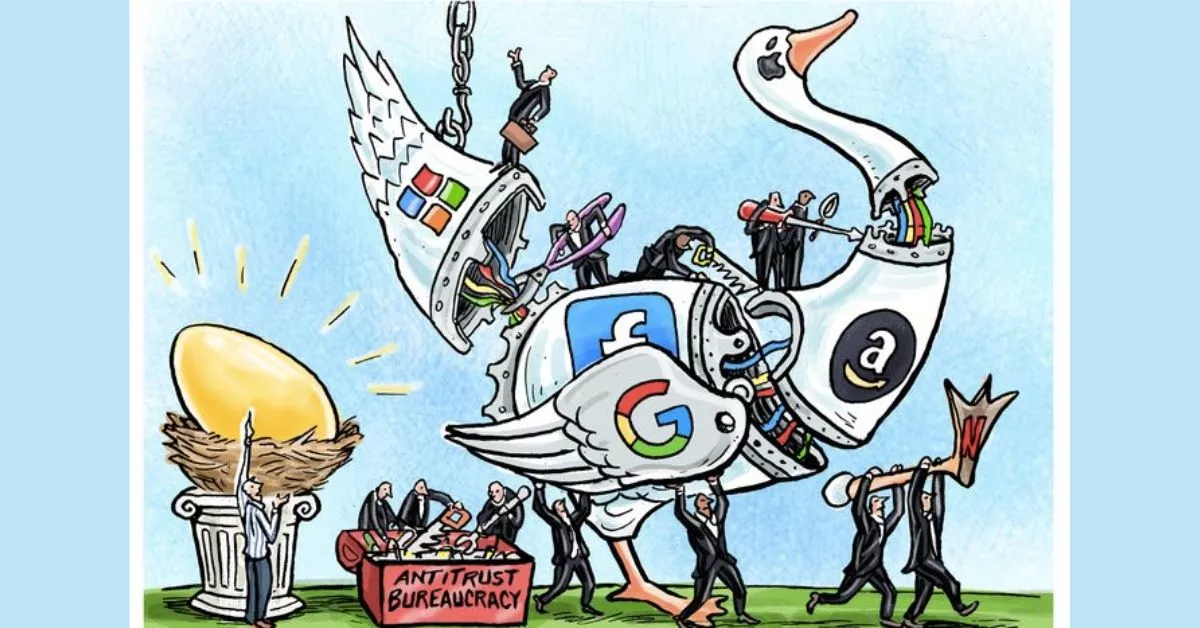In the digital age, the advertising market has seen an unparalleled transformation, primarily driven by the meteoric rise of Big Tech companies. Despite ongoing antitrust measures aimed at curbing their market dominance, giants like Google, Facebook (now Meta), Amazon, and Apple continue to command a significant share of the digital advertising space.
This exploration delves into the factors that contribute to Big Tech’s resilience and dominance in the digital ad market, the implications of antitrust measures, and the potential future landscape of digital advertising.
Big Tech’s Command Over Digital Advertising
Big Tech companies have built sophisticated advertising platforms that leverage vast amounts of data to offer unprecedented targeting capabilities. Google’s search ads and Facebook’s social ads, for instance, enable advertisers to reach highly specific audiences with remarkable efficiency.
Amazon has also emerged as a powerhouse in digital advertising by offering ads that catch consumers at the crucial moment of purchase intent. Apple, though not primarily an ad platform, influences the digital ad market through its control over app ecosystems and user data privacy standards.
The dominance of these companies can be attributed to several key factors:
- Data Monopoly: Big Tech companies have access to extensive data on user behavior, preferences, and demographics, enabling highly targeted and effective advertising.
- Platform Ecosystems: The integration of various services, from search engines and social networks to online marketplaces and mobile operating systems, creates a captive audience for advertisers.
- Technological Innovation: Continuous investment in AI and machine learning has refined ad targeting and measurement, further enhancing the attractiveness of Big Tech platforms to advertisers.
- Network Effects: The more users these platforms have, the more valuable they become to advertisers, creating a cycle that perpetuates their dominance.

The Impact of Antitrust Measures
Globally, regulators have grown increasingly concerned about the concentration of market power in the hands of a few Big Tech firms. Antitrust investigations and lawsuits in the United States, European Union, and other regions aim to address issues such as anti-competitive practices, market monopolization, and data privacy concerns.
Some of the proposed and implemented measures include:
- Breaking up Big Tech companies: Proposals to separate certain business units, such as Google’s ad business from its search engine, to reduce their market power.
- Enhancing data privacy: Regulations like the EU’s General Data Protection Regulation (GDPR) limit how companies can collect and use data, impacting the targeted advertising capabilities of Big Tech.
- Promoting competition: Efforts to ensure fair competition, such as the introduction of interoperability requirements and prohibitions on preferential treatment for own services.
While these measures have the potential to alter the landscape of digital advertising, Big Tech companies have so far demonstrated remarkable resilience. Their vast resources, ability to adapt to regulatory changes, and the entrenched position of their platforms in the digital ecosystem make them formidable players despite antitrust challenges.
The Future Landscape of Digital Advertising
Looking ahead, the digital advertising market is poised for further evolution, influenced by regulatory pressures, technological advancements, and changing consumer behaviors. Potential developments include:
- Increased diversification: Advertisers may seek alternative platforms to Big Tech, such as emerging social media networks, to mitigate risks associated with regulatory changes and market concentration.
- Growth of privacy-focused advertising: In response to heightened privacy concerns, we may see a rise in advertising models that prioritize user consent and data anonymity.
- Innovation in ad technologies: New technologies, including augmented reality (AR) and blockchain, could offer novel ways for brands to engage with consumers, challenging the current paradigms of digital advertising.

Conclusion
The dominance of Big Tech in the digital advertising market is a testament to their innovative platforms, vast data capabilities, and strategic market positioning. Despite facing antitrust measures aimed at reducing their market power, these companies have continued to thrive, leveraging their adaptability and resources to maintain a significant share of the ad market.
As the digital landscape evolves, it will be fascinating to observe how regulatory pressures, technological advancements, and shifts in consumer behavior shape the future of digital advertising. The resilience of Big Tech, coupled with the potential for new entrants and innovations to disrupt the market, promises a dynamic and ever-changing advertising ecosystem in the years to come.










